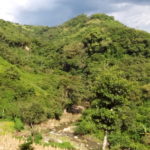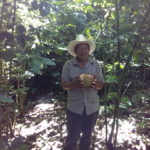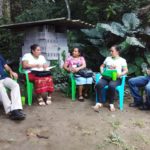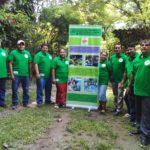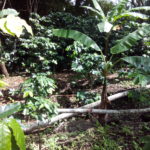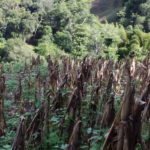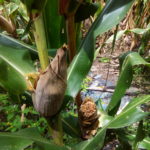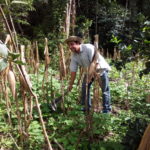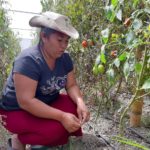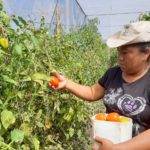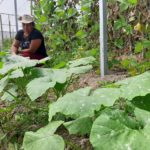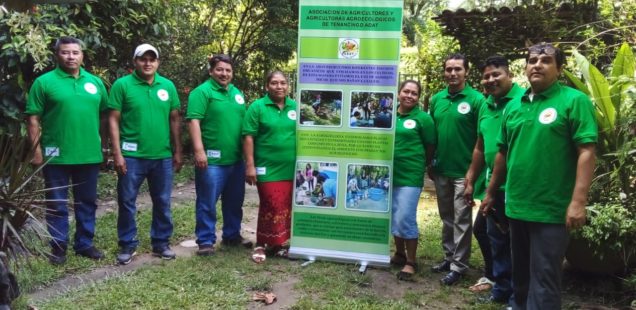
A ‘permanent solidarity’ process protects indigenous ancestral knowledge and native seeds in Ajuluco de Tenancingo, Buena Vista and Animas de Santa Cruz Michapa (El Salvador).
CESTA is an environmental organisation founded in August 1980 that since then, has been contributing to defend ecosystems and people’s wellbeing in El Salvador. It has done so by helping the communities affected by environmental conflicts to care for their water, forests and territories, to sustainably manage their waste and to fight against mining operations. In 2017, together with other social and environmental organisations, CESTA succeeded in getting the Legislative Assembly del Salvador to pass a law banning metal mining in the country—an unprecedented achievement in the entire world.
For more than a decade, CESTA has promoted agroecology as a sustainable way of life in rural and urban areas that provides quality food without using agrochemicals, artificial hormones, and GMOs. Through the sharing of knowledge and ancestral knowledge, protecting native seeds helps to produce vegetables that are not only resistant to insects and diseases, but also represent the spirituality and culture of the people and territories, and are the basis for food, medicine, soil and water conservation and handicrafts. Agroecology also addresses and analyses the historical political and social contexts in which the causes of the country’s main social and environmental problems are to be found. And, with agroecology, everyone is motivated to challenge and transform the power structures of society, putting the control of seeds, biodiversity, water, land, territories, knowledge, culture and the common good in the hands of the people who feed the world.
The initiative supported by the Paul K. Feyerabend Foundation and Pro-Natura Switzerland will protect native seeds, native trees, water, forests and land, i.e., entire territories, while strengthening food sovereignty and food security in three indigenous farming communities inhabited by descendants of the indigenous Náhuat Pipil: Ajuluco de Tenancingo, Buena Vista and Animas de Santa Cruz Michapa. The communities are located in the department of Cuscatlán, which was hard hit by the armed conflict that took place in El Salvador between 1980 and 1992. The department is characterised by the loss of local seeds and biodiversity, low water availability, the use of hybrid seeds and high-cost polluting agrotoxins, and the effects of climate change expressed in prolonged droughts and erratic rainfall. Despite problems such as the economic crisis and the Covid-19 pandemic, the families of the three communities are interested in farming in an agroecological way. They believe that using native seeds as a fundamental pillar of production, as their fast regeneration and planting are concrete steps towards the well-being and food security of the communities.
During the two years of the initiative, CESTA will facilitate a process of ‘permanent solidarity’ within and between the three communities, as well as a harmonious relationship between the people and Mother Earth. Concrete results are expected to be the establishment of 4 centres for the conservation of native seeds and forest trees that will allow their recovery and protection. It is also expected to develop processes of exchange of native seeds and forest trees within each community and with neighbouring communities, articulating efforts from farmer to farmer and among organisations in the territories.
Three of the seed and forest tree conservation centres will be managed by seed guardian collectives in each community, in charge of securing the recovery, access, selection, sowing, conservation and exchange of species. The fourth centre will be established in the Animas eco-centre, managed by CESTA, which will serve as a base to strengthen the community centres and will provide services on a permanent basis, extending its benefits to other communities. The development of a training programme for seed guardians will strengthen knowledge in the management, conservation, reproduction, and improvement of native seeds, following agroecological principles and the ancestral knowledge of indigenous peoples.
In each community, an inventory of seeds and trees in danger of extinction will be made, species collection days will be held, a community nursery will be established, and the species will be planted within the communities. In the space of two years, four exchanges of seeds and traditional knowledge will be carried out – two of them local and two at the national level. These exchanges will seek to contribute to the food and nutritional security of the villagers and to maintain a relationship of cooperation, solidarity and synergy within the communities. These exchanges will contribute to the food and nutritional security of the inhabitants and to maintain a relationship of cooperation, solidarity and synergy within the communities. They will also improve the biodiversity of the area in order to maintain a harmonious relationship between people and Mother Earth. Finally, with the strengthening of the in situ and ex situ seed conservation and research centre in Ecocentro Animas, access to native seeds will be made available to more people and the availability of seeds to the community seed conservation centres will be guaranteed.



